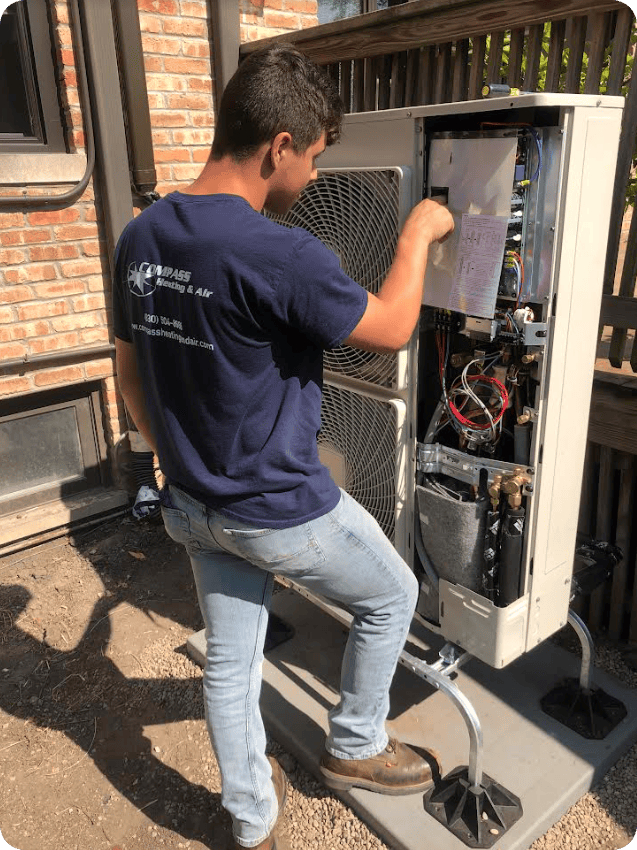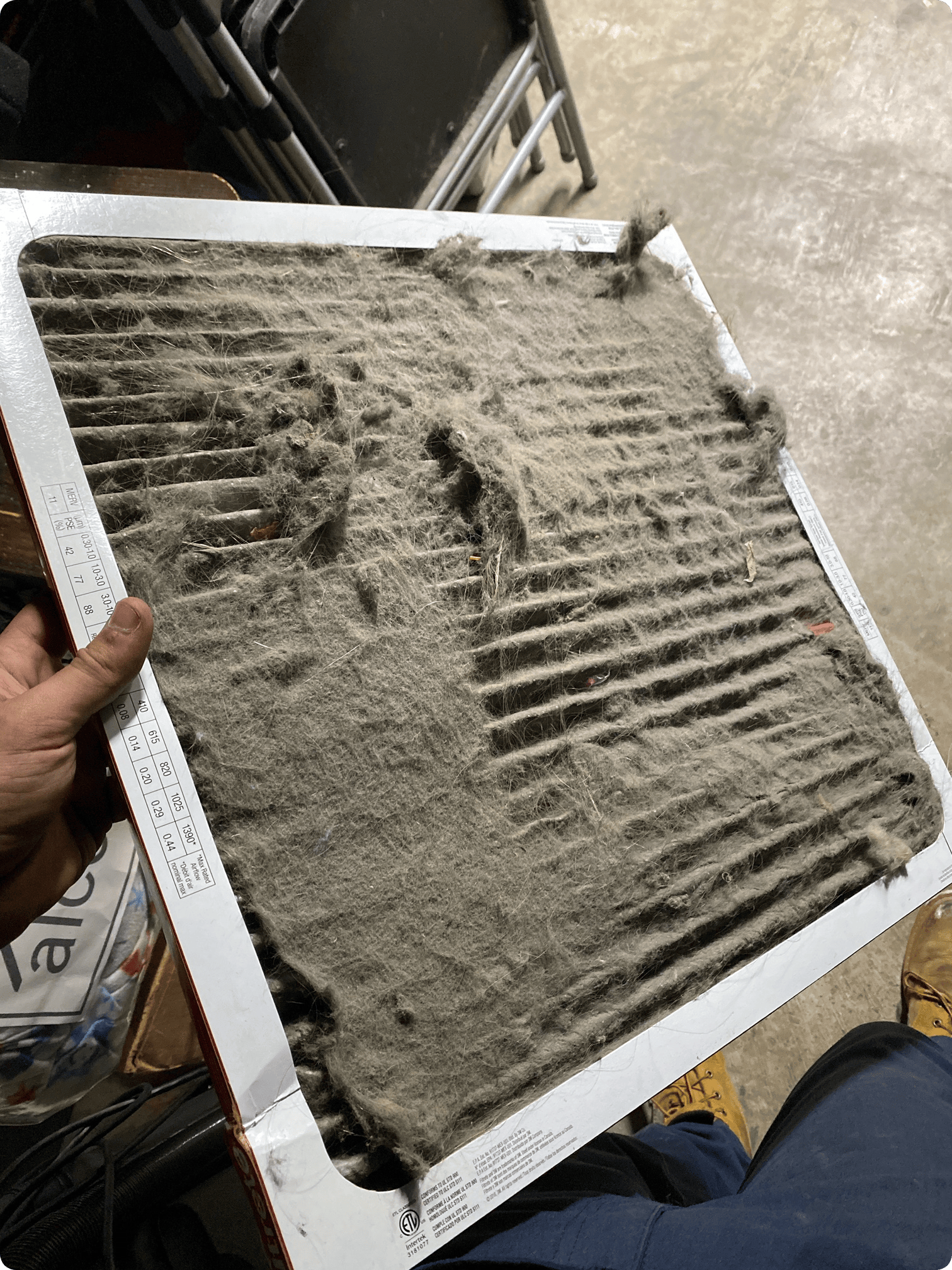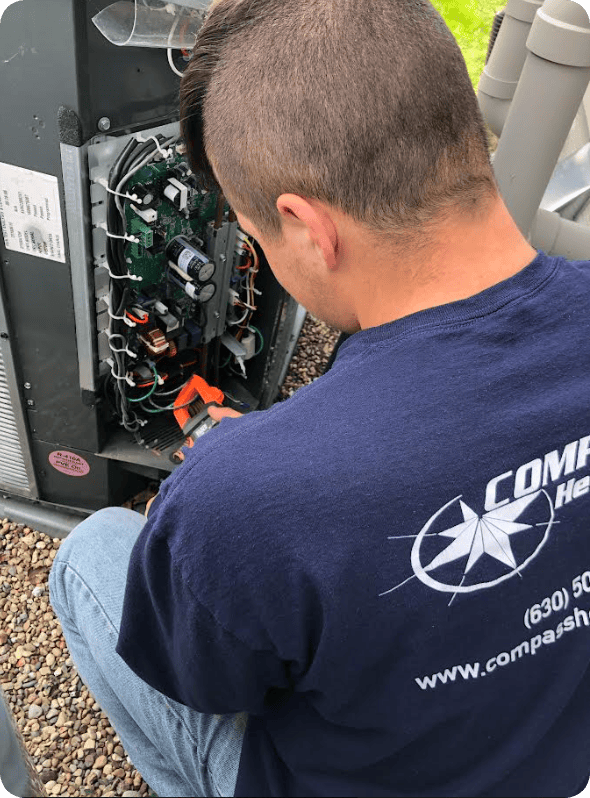Help You?
CLICK TO LEARN MORE ABOUT IRA REBATES AND TAX CREDITS
AC Maintenance Guide for Homeowners: The Comprehensive Checklist
 Your air conditioning system is so important to your home comfort in the summer, and your energy bills. I have been servicing and tuning up air conditioning systems for years, and I know how important it is to have your system looked at once a year. Through years of experience, and continued training and certifications, I feel pretty comfortable going through what it takes to keep your AC in tip-top shape.
Your air conditioning system is so important to your home comfort in the summer, and your energy bills. I have been servicing and tuning up air conditioning systems for years, and I know how important it is to have your system looked at once a year. Through years of experience, and continued training and certifications, I feel pretty comfortable going through what it takes to keep your AC in tip-top shape.
That is why we have put together this checklist to help you understand what your system requires and things that you can do yourself to keep it running efficiently.
Creating an Effective Air Conditioning Maintenance Schedule
Creating an effective air conditioning maintenance schedule is not as tough as it sounds. All it requires is a smartphone or a calendar and a pencil – if you are old school.
At Compass Heating and Air, we have made it our business to consider our clients to be a part of our team. In our view, the more you understand your systems and how they operate, the easier it is to work as a partnership to head off problems before they happen.
We have put together this comprehensive checklist specifically made for homeowners. It is designed to not only help you understand your air conditioning system but also to give you an understanding of tasks that you can do yourself to help save money or to understand when you need to call in a service technician.
We will cover the following:
- Ideal Maintenance Timeframes
- DIY vs Professional Maintenance
- External Unit Cleaning (Condenser and Compressor)
- Thermostat Checks
- Addressing Electrical Concerns
- Resolving Compressor Short-cycling
- Inspecting Refrigerant Tubing and Levels
- Examining Drain Pans
- Assessing Ductwork
Keep in mind that some of the items listed require a skilled technician to perform. But understanding how these components work will help you flag any potential problems.
Ideal Maintenance Timeframes
A proper air conditioning maintenance checklist is essential for homeowners to keep their AC systems in top shape.
Optimal maintenance timeframes usually involve servicing the air conditioner before the warm months begin, ensuring peak performance and energy efficiency. Implementing a well-planned AC service checklist can prevent costly repairs and extend the life of your system.
Understanding An HVAC System
It is crucial for homeowners to understand the key components of their HVAC system to follow an effective air conditioning maintenance checklist. The AC checklist typically includes tasks such as cleaning or replacing filters, checking thermostat settings, and inspecting the evaporator and condenser coils.
Familiarizing yourself with your HVAC system’s specific needs will help you understand why you need AC service, and the best times for it.
Remember, a well-maintained AC system not only saves you money on repairs but also ensures a comfortable living environment during the warm months. By following an AC maintenance checklist and scheduling annual maintenance, homeowners can significantly improve the efficiency and longevity of their air conditioning systems.
DIY Vs. Professional Maintenance
The easiest and best DIY or do-it-yourself job is observation. As the homeowner, you know “what feels right”. You have experienced your system under the hottest weather when AC demand is high and everything is running cool and comfortable. So you know when something feels “off”.
There are many quick fixes that you can check yourself, such as checking for clogged air filters. But if you run down your DIY checklist and it still isn’t quite right, it is time to consult with a trained technician.
DIY Air Conditioning Maintenance: Tasks You Can Tackle
As a homeowner, you can handle some basic air conditioning maintenance tasks by yourself. These DIY tasks can help you save money, extend your AC unit’s lifespan, and improve its efficiency. Start by checking the manufacturer’s operating manuals for specific instructions related to your AC model. Some common DIY tasks include:
- Cleaning or replacing the air filters regularly
- Inspecting and cleaning the condenser coils
- Ensuring the outdoor unit is free of debris and obstructions
- Checking the thermostat settings for proper operation
- Remember, always turn off the power to your AC unit before performing any maintenance tasks.
Professional AC Maintenance: When to Call the Pros
While DIY maintenance can be helpful, there are times when it’s best to call a professional service technician for more complex tasks. These tasks often require specialized knowledge, tools, and experience to ensure the AC unit’s optimal performance and safety. Some instances when you should opt for professional maintenance include:
Annual or semi-annual tune-ups for a thorough inspection, cleaning, and servicing of the entire system
Repairing or replacing faulty components, such as the compressor, evaporator coil, or blower motor
Diagnosing and fixing refrigerant leaks or electrical issues
DIY Air Conditioner Maintenance Tasks and Instructions
In this section, we will review the steps that almost any homeowner can perform. While these steps may seem not very important, performing them on a regular basis has proven to help extend the health and life of your system and cut down on energy bills.
External Unit Cleaning (Condenser and Compressor)
Step 1 – Disconnect Power to the Unit
Before performing any air conditioning maintenance, always disconnect power to the AC system to ensure your safety. Turn off the breaker and unplug the unit if possible.
Step 2 – Remove Debris and Clear Surrounding Area
Inspect the outdoor unit, also known as the condenser and compressor, for debris like leaves, branches, and dirt. Clear at least a two-foot radius around the unit for proper airflow.
Step 3 – Clean and Align the AC Fins
Gently brush the AC fins with a soft brush to remove dirt and debris. Straighten bent fins with a fin comb to improve airflow and overall efficiency.
Step 4 – Clean the Condenser Fan
Remove the fan cage from the outdoor unit and clean the fan blades using a damp cloth or a vacuum cleaner with a soft brush attachment.
Step 5 – Clean the Fins
Using a garden hose, spray the fins from inside the unit to remove accumulated dirt. For stubborn dirt, use an AC coil cleaner solution and follow the manufacturer’s instructions.
Air Filter
 A clean air filter is the first line of defense against dirt and debris in your AC. Air filters are pretty easy to find at hardware stores, or you could order one online. Always remember to check your service manual for the correct style and size.
A clean air filter is the first line of defense against dirt and debris in your AC. Air filters are pretty easy to find at hardware stores, or you could order one online. Always remember to check your service manual for the correct style and size.
You can also pull the current filter out and take a look at that. We recommend buying a few at a time so you don’t have to run to the store every few months.
Importance of Regular Filter Maintenance
Air filter maintenance is essential for the efficiency and longevity of your air conditioning system. It also helps keep the air inside your home clean. Regularly changing filters prevent dust and debris from clogging the evaporator and condenser coils, reducing strain on the system.
When to Replace Your Air Filter
Typically, replace your air filter every 30 to 90 days. Factors like pets, allergies, and living in a dusty area can require more frequent replacements.
How to Replace the Air Filter
Locate the air filter in your AC system, remove the old filter, and replace it with a new one, ensuring it’s facing the correct direction.
Choosing the Right Air Filter for Your Home
Choose an air filter with the appropriate MERV (Minimum Efficiency Reporting Value) rating for your home’s needs. Higher MERV ratings provide better filtration but may reduce airflow. Looking at your current filter is a good way to figure out what works best.
Factors Affecting Filter Lifespan
Several factors affect filter lifespan, such as pets, allergies, and environmental conditions. Monitor your filter regularly and adjust the replacement frequency accordingly.
Checking Thermostat for Accurate Operation
An essential part of the AC System Maintenance Checklist is ensuring the thermostat functions properly. Test the thermostat by setting it to cooling mode and lowering the temperature. If the AC doesn’t turn on, check the batteries or call a professional.
Professional Air Conditioning Maintenance Checklist
Some tasks should only be done by a qualified, licensed technician. Internal system parts, electrical workings, coolants, and ductwork repairs require the kinds of expertise – and in some cases licensing – that only a qualified technician can perform.
Routine Inspections and Maintenance
Professional AC Maintenance Checklist
To keep your air conditioning system running efficiently, it’s essential to perform regular preventative maintenance. Routine inspections can help identify potential issues before they become more significant, saving you time and money in the long run. It also keeps your home more comfortable! A professional AC maintenance checklist should cover:
- Inspecting and cleaning filters, coils, and fins
- Checking electrical wirings and controls
- Assessing the compressor and motor
- Examining ductwork, drain pans, and refrigerant levels
- Testing thermostat operation
Addressing Electrical Concerns
Electrical issues can lead to inefficient AC performance and potential hazards. Regularly inspecting electrical wirings and controls is crucial to ensure the safe and proper functioning of your air conditioning system. A professional technician can identify and repair any damaged or loose connections, replace worn-out components, and ensure that your system is safely grounded.
Resolving Compressor Short-cycling
Compressor short-cycling occurs when the compressor turns on and off frequently, reducing the efficiency of your air conditioning system. This can result from improper refrigerant levels, dirty coils, or faulty thermostat settings. A professional technician can diagnose the issue and perform the necessary air conditioning repair or air conditioning replacement to resolve the problem.
Inspecting Refrigerant Tubing and Levels
 Maintaining the correct refrigerant levels is essential for your AC unit to function efficiently. Too much or too little refrigerant can lead to poor performance and higher energy bills. A professional technician will inspect the refrigerant tubing for leaks and ensure that the system is charged with the correct amount of refrigerant as part of your routine air conditioning maintenance.
Maintaining the correct refrigerant levels is essential for your AC unit to function efficiently. Too much or too little refrigerant can lead to poor performance and higher energy bills. A professional technician will inspect the refrigerant tubing for leaks and ensure that the system is charged with the correct amount of refrigerant as part of your routine air conditioning maintenance.
Examining Drain Pans
Drain pans collect condensation from the air conditioning system and prevent water damage. Over time, they can become clogged or damaged, leading to potential issues. Regularly inspecting and cleaning drain pans helps ensure proper drainage and prevents mold growth, odors, and water damage to your home.
Assessing Ductwork
Ductwork plays a critical role in distributing cool air throughout your home. Leaky or poorly insulated ducts can result in energy loss and uneven cooling. As part of your professional AC maintenance checklist, a technician will assess the ductwork to identify any leaks, blockages, or insulation issues. This may involve sealing gaps, cleaning debris, or recommending air conditioning installation if the ductwork is beyond repair.
Benefits of Annual AC Maintenance
In this section, we will lay out the tangible benefits that performing annual maintenance checks can give you. Yes – it is sometimes hard to spend money when there doesn’t seem to be a problem. But by performing these checks, you can save money on monthly energy bills and on big repair expenses that could have been headed off with a seasonal check up.
Reduced Repair Costs
Regular AC maintenance can significantly reduce repair costs for your HVAC system. By cleaning the condenser, inspecting the evaporator coils, and ensuring the proper functioning of the fan motor, you can prevent minor issues from escalating into expensive repairs. Annual maintenance of your AC unit will keep your cooling system running smoothly and efficiently.
Lower Utility Bills
A well-maintained AC unit consumes less energy, leading to lower utility bills. Cleaning the condenser with a soft brush and using a coil cleaner on the evaporator coils ensures proper airflow and efficiency. Regular maintenance of your AC unit helps your cooling system to run at its optimal performance level, ultimately saving you money on energy costs.
Avoiding Complete System Failure
Annual AC maintenance is crucial for avoiding complete system failure. Inspecting and addressing potential issues with your air conditioning unit can prevent costly breakdowns and extend the lifespan of your HVAC system. Regular maintenance checks, including cleaning the evaporator coil and ensuring proper fan motor operation, are essential for keeping your cooling system in top condition.
Prolonged Equipment Lifespan
Proper AC maintenance can prolong the lifespan of your HVAC systems. By keeping the condenser unit clean, ensuring proper airflow through the evaporator coils, and addressing any issues with the fan motor, you can extend the life of your air conditioning unit. Regular maintenance not only saves you money on repairs but also allows your system to run efficiently for a longer period.
Enhanced System Safety
Safety is an essential aspect of any HVAC system. Annual AC maintenance, including cleaning the condenser with a soft brush, using a coil cleaner on the evaporator coils, and ensuring the proper functioning of the fan motor, contributes to the overall safety of your cooling system. Regular maintenance checks help prevent electrical issues, refrigerant leaks, and other potential hazards that could compromise the safety of your air conditioning unit and the well-being of your household.
AC Service Checklist FAQs
Compass Heating and Air has been serving the Gilbert, IL area since 2012. And in that time we have compiled this short list of our customer’s most frequently asked questions. If you have a question and don’t see it answered on this list, reach out to us.
How can I improve my AC cooling?
There are a few ways that the homeowner can improve the AC cooling in your home.
- First and easiest – Check your air filters to make sure that airflow is not impeded by dirt, debris, pet fur, or dander.
- Second – Make sure your outside units are free and clear of debris around the intake areas.
- Third – Do a brief energy efficiency home check. Check for drafty windows and doors and areas where cold air may escape and consider improving insulation.
- Fourth – If none of these DIY recommendations work, contact your AC specialist for a service call. Since you have already performed the base checks, he or she can get right down to the solution and have you up and cooling in no time.
How do I keep my outside AC unit cool?
Keeping your outside AC unit cool is an important step to take for the health of your AC system. Consider planting evergreen bushes suitable for your planting zone that will not drop needles, such as Skip Laurel. They provide a lush evergreen cover that is deer resistant and hardy enough for our Illinois winters.
If planting is not appealing to you consider installing an awning or tightly woven decorative fencing. Radiant heat coming off of brick or stucco can really stress your outdoor unit.
What happens if an AC is not used for a long time?
If you are not using your AC for an extended period of time, there is no need to worry. Modern air conditioning units were built to lay unused for months at a time. In fact, they are so durable that they can even sit unused for a few years. The only requirement is that they still need their regular maintenance checks and inspections. There is no getting around that! Reliable AC maintenance In Gilberts, IL.
Call Compass Heating and Air at (630) 504-8688, to speak with your reliable AC maintenance In Gilberts, IL.

